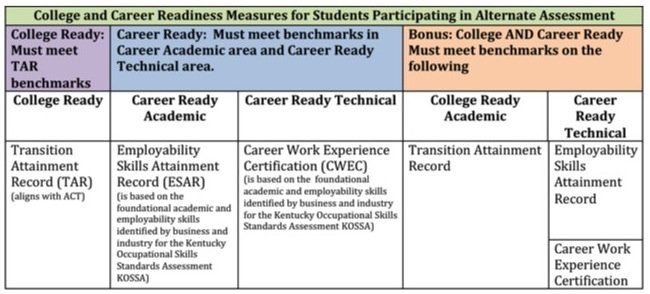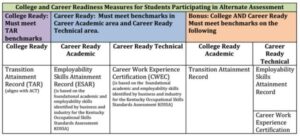By Jill Griffiths, SPDG-CCR Project Director
Within Kentucky’s Unbridled Learning Accountability Model, the College and Career Ready (CCR) measures for students with significant cognitive disabilities have been revised. The CCR measures now align more closely with those for students in the general assessment. The assessment instruments were expanded beyond the Transition Attainment Record (TAR), and Career Ready accountability was strengthened.
- The TAR is retained as the measure for College Ready.
- A new assessment, the Employability Skills Attainment Record, will assess Career Ready: Academic.
- A Career Work Experience Certification process was developed for Career Ready: Technical.
- The opportunity for a student participating in the alternate assessment to be both College and Career Ready is now included.
Students will be awarded Career Ready status by the Office of Career and Technical Education.
Stella Beard, who represents parents as a member on the CCR Instructional Workgroup, shares her thoughts on the changes made: “My son Clayton has been on the Alternate Assessment since the 4th grade. As a parent, making that decision was life changing for him. The decision came from looking at his IQ score on a piece of paper, looking at the data, looking at the requirements he needed to graduate, listening to folks around me, and trying to decide what his future would look like down the road. I have fought for years to see change for this 1% population to exit or “graduate” with the skills needed to have paying jobs in their area of interest when their high school days are complete. The name change to “Alternative High School Diploma” was a step in the right direction, but was only a change in the name. Fast forward a few years…Clayton is now 19 and “graduated” this past June with an Alternative Diploma. Although I will not see these great changes I helped develop happen in his life, I am excited for the future of other families that will benefit from the hard work of this committee. For that I am grateful and will celebrate!”
The table below illustrates the revisions:
Timelines for Implementation
2015-2016
- Four CCR Usability Sites begin implementation
- All LEAs engage in CCR readiness activities
2016-2017
- Statewide pilot
- Usability Sites continue
2017-2018
- Accountability begins – first year points can be earned under the revised measures
- Usability Sites complete activities
Four CCR Usability Sites were chosen, via a nomination and application process, to test the products and processes related to the revisions By August district CCR teams at each site will complete the two-day initial training and begin implementing their first year action plan. The sites chosen include high school classrooms serving students participating in the alternate assessment in Campbell, Christian, Simpson, and Spencer County Schools.
In addition to the revised measures is the development of the CCR Transition to Postsecondary (Instructional) Model. The instructional model complements and supports the revised measures for assessment and accountability, but also defines instructional and programming concepts beyond the accountability model.
The instructional model addresses student transition competencies that will be taught along with the Alternate K-PREP Standards; identifies Courses of Study-Alternate Assessment; incorporates person centered planning with required transition planning; includes experiences with career exploration and work-based learning via a Career Work Experience Certification process; aligns with the KY Department of Education (KDE) Office of Career and Technical Education Work-Based Learning Manual; and encourages collaboration with the Office of Vocational Rehabilitation (OVR) to provide community based work experiences.
When the Alternative High School Diploma was developed in 2012, KDE staff recommended approval of the amendments to the law (704 KAR 3:305). The accompanying staff note also included recommendations that discussions continue around the experiences of students with the most significant cognitive disabilities, and making their readiness to transition to postsecondary life even more meaningful (e.g., flexibility in high school programming to allow students to pursue more career training, while continuing to meet academic standards; a range of curricular options critical to successful transition; etc.). These recommendations were addressed by the CCR Transition to Postsecondary (Instructional) Model.
It is the hope of all involved with the project that students participating in the alternate assessment will leave high school with the “soft skills” needed for success in their next environment and that positive post-school outcomes for the students increase.




